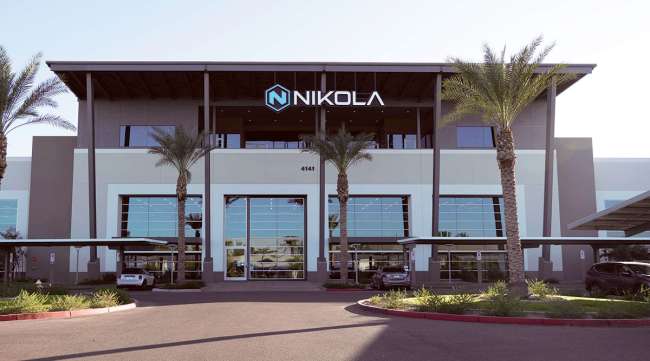Nikola’s Asset Liquidation: What’s on the Table?
The focus of Nikola, a manufacturer known for its hydrogen fuel cell tractors, has shifted toward liquidating its remaining assets. This includes an array of intellectual property (IP) that could significantly influence future developments in logistics and transportation. Bankruptcy courts are now determining the path forward for the liquidation of these valuable intangible assets.
Intellectual Property and Auction Plans
The company’s ongoing bankruptcy procedures include plans to auction off intellectual property, an essential element that covers patents, proprietary truck management software, designs, and trade secrets. Following court approval, a specialized consultancy has been appointed to facilitate these sales.
On June 17, Judge Thomas Horan sanctioned the hiring of Hilco Streambank to spearhead the marketing of these assets. With a strong history of managing similar sales, Hilco will likely draw significant interest in Nikola’s IP, aiming to set the stage for competitive bidding.
List of Assets Available
- Patents
- Proprietary software
- Design blueprints
- Research and development data
- Customer information
- License agreements
Environmental Credits: The Stalking Horse Bidder
In addition to the IP sale, Nikola is also looking to sell its environmental credits, which are part of its compliance with ecological regulations in the trucking industry. Paccar Inc. has emerged as the stalking horse bidder for these credits, which sets a baseline price that other bidders cannot go below.
These environmental credits are significant for companies in the logistics field. They provide a mechanism for financing cleaner operations while ensuring compliance with stringent regulations imposed by authorities.
Impacts on the Industry
The logistics sector is on constant alert for evolving technologies and alternative fuel solutions. As such, the sale of Nikola’s environmental credits and intellectual property is indicative of a larger trend towards sustainable logistics practices. Maintaining compliance with evolving standards could influence operational costs, partnerships, and even vehicle acquisition strategies across the supply chain.
Navigating Physical Asset Bids
As the auction proceeds, potential buyers have begun examining physical assets including trucks, manufacturing inventory, and refueling equipment. The sites in Phoenix, Coolidge, and Fontana are open for inspection prior to the bidding event.
According to Vince Lorenz from Nations Capital, which oversees the sale, significant attention has been given to Nikola’s manufacturing facility assets, with options for viewing the remaining stock of new hydrogen fuel cell trucks now available to interested parties.
| Asset Type | Details |
|---|---|
| Trucks | 103 new Class 8 hydrogen fuel cell Tre trucks available for bidding. |
| Refueling Equipment | Includes six mobile refuelers and six hydrogen-hauling trailers. |
| Manufacturing Inventory | Stored primarily at the Coolidge facility, including stationary equipment. |
Challenges and Opportunities
Despite a rocky journey, the pending sale of these assets brings a transformative opportunity for firms looking to innovate in the realm of sustainable transport. California fleets, the primary users of Nikola’s vehicles, must ensure their hydrogen fuel cell tractors remain compliant with local regulations, which could mean competing for these assets.
Unfolding Financial Dynamics
Nikola’s navigation through bankruptcy has been intricate, marked by several significant decisions. The recent approval for the sale process of environmental credits resonates beyond mere transactions; it serves the strategic interests of major players within the industry.
Paccar’s role as the stalking horse signals a notable shift, establishing a defined cost structure which could potentially guide future environmental practices within logistics. Even though there were no prior bidders for Nikola as a whole, the focus on specific environmental credits suggests an opportunity for targeted investments in greener technologies.
Previous Sales and Future Projections
Earlier this year, Nikola sold its production and assembly facilities to electric vehicle maker Lucid, allowing for some recovery of capital through established, albeit restructured, operations. The $30 million agreement for the 691,000-square-foot facility is a noteworthy marker as it aligns with an ongoing transition to eco-friendly vehicles.
Divesting Equity Stakes
Moreover, Nikola’s decision to divest its equity stake in Wabash Valley Resources Holdings underscores an adaptive strategy. For a mere $1 million return on a $50 million investment, the move denotes a failure to capitalize fully on prior investments, yet it reflects a calculated pivot towards more sustainable ventures.
Final Thoughts
The unfolding saga of Nikola illustrates a quintessential chapter in the evolution of sustainable transport practices and asset utilization within the logistics domain. While external opinions and assessments can offer insights, personal experiences in utilizing services like those provided by GetTransport.com speak volumes. With their affordable, global cargo transport solutions, clients can secure the best deals for all their transport needs.
Utilizing GetTransport.com allows users to make informed decisions, ensuring they do not back the wrong horse when it comes to logistics. Experience the convenience and cost-effectiveness of global cargo services tailored to accommodate various transportation needs. Book your Ride at GetTransport.com.

